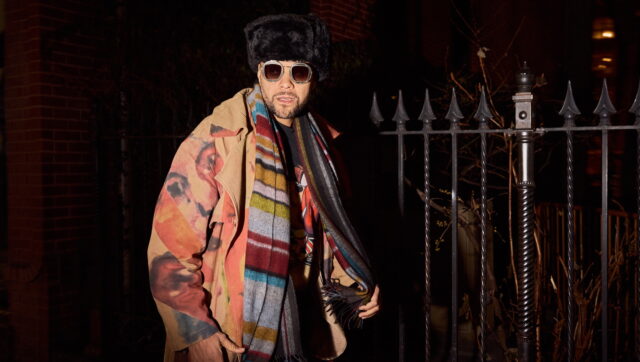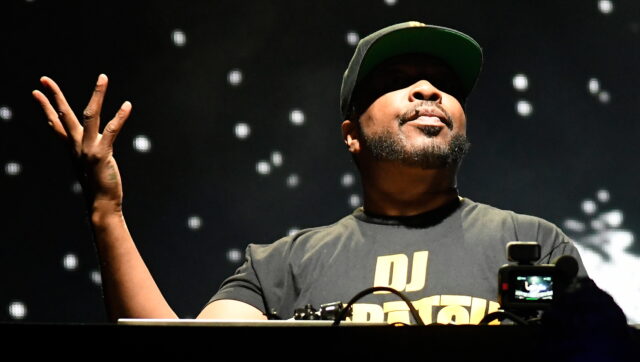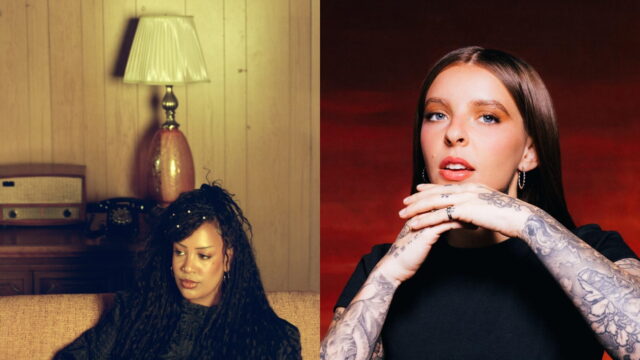Newark Vibe: How Jersey Club Won
Today, Jersey club music is a global sensation — thriving on TikTok, utilized by Drake and Lil Uzi Vert and resonating throughout the Hot 100. But its deep roots are defined by hard-earned regional innovation.
by Kristin Corry
Music discovery is changing every day — and it has certainly become more nimble in the last decade. When I entered college in 2010, I thought I knew what was popular, just like every overconfident teenager who grew up on TRL or 106 & Park. As an aspiring music journalist, I learned about new artists and trends by reading constantly. But the real education happened socially, at mixers and house parties so hot you, and the walls, would sweat.
What I remember most are the scenes that weren’t shown on any glitzy cable network, specifically Jersey club music. Jersey club felt like a secret language known only by its native speakers — kids who had grown up witnessing its development and could now Sexy Walk beyond state lines. I’m thinking of songs like DJ Jayhood’s “Hit It to the Beat,” DJ Frosty’s “Ride That Wave,” Tim Dolla’s “Swing Dat Shit” or Blaqstarr and DJ K-Swift’s “Hands Up Thumbs Down,” a Baltimore club hit which, to my untrained ear, sounded awfully close. Back then, parties played a role in how Jersey club music was disseminated. Now all you need is TikTok.
In 2013, SPIN defined Jersey club’s m.o. as “rich on borrowing, lifting and re-sculpting the sounds of Baltimore’s go-to breaks while relying heavily on vocals sampled from pop, rap, R&B and pretty much any bit of pop-culture detritus — TV-show themes, Internet memes and popular cell-phone rings included.” An extension of the Miami bass and Baltimore club that came before it, Jersey club naturally suits TikTok in ways that other genres can only attempt to master — just look at the popularity of “sped-up” tracks on the platform.
This symbiotic relationship means that Jersey club is now a staple sound of mainstream popular music. Late last year, New Jersey’s DJ Smallz 732 flipped Coi Leray’s rambunctious “Players” into a club remix that garnered 11 million views on YouTube — just as many as the original. Lil Uzi Vert’s “Just Wanna Rock,” produced by Newark’s MCVERTT, peaked at No. 10 on Billboard’s Hot 100. But perhaps the biggest co-sign of them all was Drake’s upcycling of DJ Tameil’s infamous bed squeak on Honestly, Nevermind’s “Currents” last June.
Still, much of how Jersey club music performs on TikTok is owed to Cookiee Kawaii’s “Vibe (If I Back It Up),” which felt like a socially distant salve during the height of the pandemic. With “Vibe,” Kawaii, who hails from Irvington and has been making Jersey club since 2011, was able to take the genre global — without it being co-opted and repurposed by the EDM scene.
Although virality is baked into the genre today, it started out as a much more grassroots movement. In the late ’90s, Newark native Tameil Paynes, a.k.a. DJ Tameil, began taking trips to visit the burgeoning Baltimore club scene only a few hours away. Sifting through the bins at Music Liberated, a Baltimore shop with a wide range of sounds from local artists, Tameil reinvented his new records at teen parties back home. Considering Baltimore’s close proximity to Newark, it wasn’t long before other DJs started making the journey themselves. After Tim Dolla and Mike V released a diss track aimed at Tameil, tension brewed among the Newark-based DJs. But Tameil would later become a member of Brick Bandits — Tim Dolla, Mike V and fellow Newark DJ Da Black Mic, among others — a music collective dedicated to creating a modern take on house music.
After the owner of Music Liberated, Bernie Rabinowitz, died in a car accident in 2003, the DJs had to figure out how to move forward with Jersey club. Five years later, the Bandits caught the attention of Diplo, who signed them to his label, Mad Decent.
But Newark’s storied history of house music reaches back much further than Tameil and Jersey club. In the late ’70s, Club Zanzibar — the ballroom of the infamous Lincoln Motel — was fashioned to be an amalgamation of New York City dance havens Studio 54 and Paradise Garage. Soon, celebrities like Grace Jones and Kool and the Gang were traveling to Newark’s newest hot spot, and Tony Humphries, from KISS FM, became a resident DJ. Returning from Chicago, the club’s Billie Prest slipped Humphries a copy of CeCe Rogers’ “Someday,” a socially aware anthem produced by house pioneer Marshall Jefferson. With house music in his arsenal, the DJ began crafting what would become the Jersey Sound.
Like Tameil with Jersey club, Humphries built the Jersey Sound using the relationships he fostered. Abigail Adams, the owner of Movin’ Records and known to many as “the fairy godmother of house music,” would pass house records to Humphries, who would integrate them into his sets using the same formula he did on the radio: sandwiching underground tracks between bigger hits. “When we started getting house releases — from record pools, but a lot from Abby over at Movin’ Records in East Orange — I used them as kind of mixing tools, mainly,” Humphries once recalled. “Bridge records. If I was going to play Aretha Franklin or something, and wanted to play Luther Vandross after that, I would use a house track to get from one to the other.” Adams understood the importance of Humphries’ platform at Zanzibar, and the club eventually became the best place to market new house music.
From Club Zanzibar in the ’70s to the teen parties of the millennium and TikTok today, the function of Jersey club music remains largely unchanged. A huge part of its current resurgence is how well it dovetails with drill music, as seen in the careers of Newark rapper Bandmanrill (who works frequently with MCVERTT to establish Jersey’s drill scene) and Bronx drill princess Ice Spice. “Boy’s a liar Pt. 2,” Ice Spice’s recent collaboration with PinkPantheress, is the epitome of a commercial hit, and serves as a portent of just how embedded in pop culture Jersey club could become. Though not one of the collaborators is from Jersey — Pantheress is from the U.K. and producer Mura Masa is from Guernsey — the track, which peaked at No. 3 on Billboard’s Hot 100, is stylistically a descendant of Jersey club music.
In an interview with Billboard in February, Mura Masa acknowledged that he was inspired by Jersey club, yet proceeded with caution. “It’s really cool what’s happening with Baltimore and Jersey and these really localized American genres that are having moments,” he said. “‘Just Wanna Rock,’ the [Lil Uzi Vert] song, is the biggest example of that. If I remember correctly, that is something that we talked about that day, but I really didn’t want to go fully into that and make a pastiche of something that I’m not locally a part of. But yeah, there’s bed squeaks in there, there’s the kick [drum] pattern, things like that.”
With any luck, Mura Masa’s production and others like it will elevate not only the sound of Jersey club but also the regional DJs who worked tirelessly to create it.



